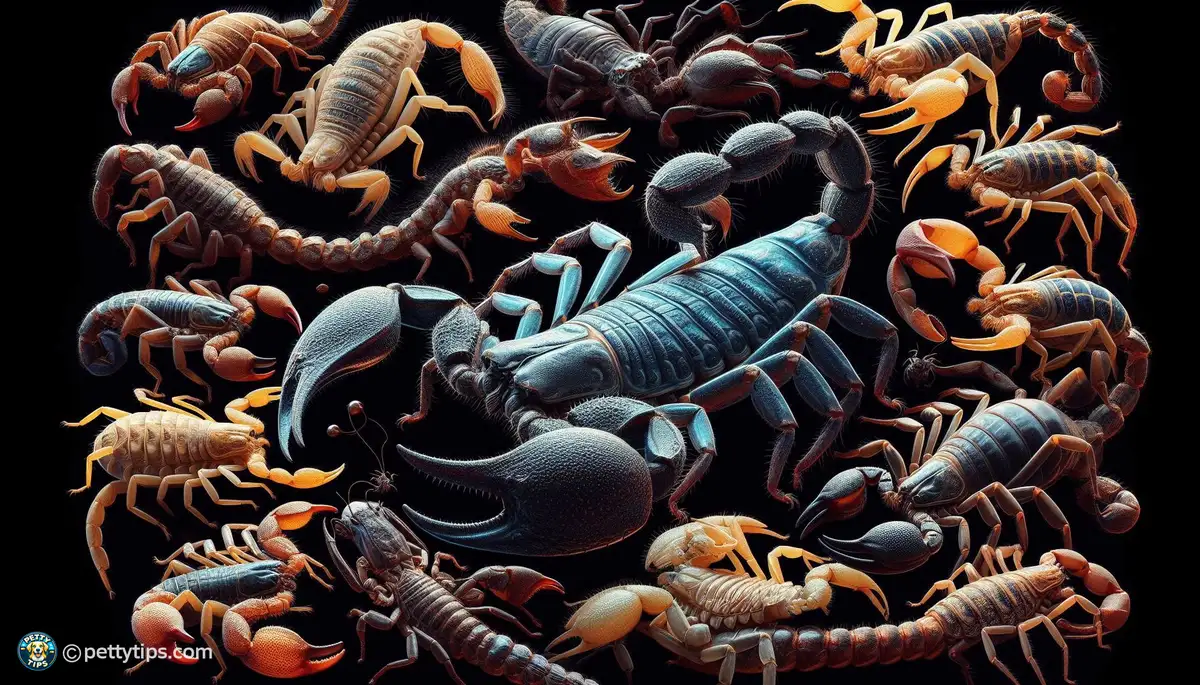- Home
- Exotic Pets
- The Fascinating World of Scorpions: Choosing the Right Species
The Fascinating World of Scorpions: Choosing the Right Species

A Primer on Scorpions
Scorpions, with their fearsome appearance and enigmatic behavior, have captivated humans for centuries. Belonging to the class Arachnida, they are close relatives of spiders, ticks, and mites. Despite their reputation for danger, only a few of the roughly 1,500 known species are considered medically significant to humans. Most scorpions are harmless to people and make fascinating pets.
Anatomy and Physiology
To truly appreciate scorpions, it's essential to understand their anatomy and physiology. These creatures possess a unique body structure, characterized by four pairs of legs, a pair of pedipalps, and a tail ending in a venomous stinger. Their exoskeletons, composed of chitin, provide protection and support. Scorpions also have specialized sensory organs, including pectines, which help them navigate their environment and detect prey.
Behavioral Traits
Scorpions exhibit a range of intriguing behaviors that make them both captivating and challenging pets. They are nocturnal creatures, preferring to hunt and explore under the cover of darkness. Many species are solitary, only coming together during mating season. Some scorpions are burrowers, while others are adept climbers. Understanding these behavioral traits is crucial for providing suitable care in captivity.
Popular Species for Pet Owners
When it comes to keeping scorpions as pets, not all species are equal. Some are better suited for beginners, while others require more experience and specialized care. Among the popular choices for pet owners are the Emperor Scorpion (Pandinus imperator), the Asian Forest Scorpion (Heterometrus spp.), and the Arizona Bark Scorpion (Centruroides sculpturatus). Each species has its own unique characteristics and care requirements.
Choosing the Right Scorpion
Considerations for Beginners
For those new to scorpion keeping, selecting the right species is crucial for a positive experience. Beginner-friendly species, such as the Emperor Scorpion, are relatively docile and easy to handle. They have straightforward care requirements and are less likely to pose a threat to their owners. Additionally, these species are readily available in the pet trade, making them accessible to aspiring scorpion enthusiasts.
Intermediate and Advanced Options
As enthusiasts gain experience and confidence in caring for scorpions, they may seek out more challenging species to expand their collections. Intermediate and advanced options, such as the Arizona Bark Scorpion or the Deathstalker (Leiurus quinquestriatus), offer unique behaviors and appearances but require a higher level of expertise in husbandry and handling. These species may also have more potent venom, necessitating caution during interactions.
Research and Education
Regardless of experience level, thorough research and education are essential before acquiring any scorpion species. Prospective owners should familiarize themselves with the specific care requirements, habitat preferences, and behaviors of their chosen species. Understanding the potential risks associated with handling and housing scorpions is crucial for both the well-being of the owner and the animal. Additionally, joining online forums and seeking advice from experienced keepers can provide valuable insights and support.
Ethical Considerations
When considering keeping scorpions as pets, it's essential to approach the decision ethically and responsibly. Captive breeding is preferable to wild-caught specimens, as it helps reduce the impact on natural populations and ensures healthier animals. Additionally, prospective owners should be prepared to provide adequate care throughout the lifespan of their scorpions, which can range from several years to over a decade, depending on the species. responsible ownership includes providing proper housing, nutrition, and veterinary care when needed.
Providing Proper Care
Housing and Enclosure Setup
Creating a suitable habitat for pet scorpions is crucial for their health and well-being. Enclosures should mimic their natural environment, with adequate substrate for burrowing, hiding spots, and climbing opportunities. Temperature and humidity levels must be carefully monitored and maintained within the optimal range for each species. Ventilation is also essential to prevent mold and bacterial growth.
Diet and Feeding
Scorpions are carnivorous predators, feeding primarily on insects and other small invertebrates. In captivity, they can be offered a variety of prey items, including crickets, mealworms, and roaches. feeding frequency depends on the size and species of the scorpion, with larger individuals requiring more substantial meals less frequently. It's crucial to observe feeding behavior and adjust portion sizes accordingly to prevent overfeeding or obesity.
Handling and Interaction
While some scorpion species can tolerate handling to varying degrees, it's essential to approach interactions with caution and respect. Always use proper handling techniques, such as gently coaxing the scorpion onto your hand or using a soft brush to guide them. Avoid sudden movements or disturbances that may startle the scorpion, as this could lead to defensive behavior and potential stinging. It's also essential to wash hands thoroughly after handling to remove any venom residue.
Health and Veterinary Care
Regular health checks are essential for monitoring the well-being of pet scorpions. Signs of illness or injury, such as lethargy, loss of appetite, or abnormal behavior, should be addressed promptly by a qualified exotics veterinarian. While scorpions are generally hardy creatures, they are susceptible to certain health issues, such as dehydration, parasites, and injuries from falls or fights with other scorpions. Providing a clean and stress-free environment can help prevent many common health problems.
Conclusion
In conclusion, keeping scorpions as pets can be a rewarding and enriching experience for enthusiasts willing to invest the time and effort into proper care. By understanding the unique characteristics and requirements of different species, pet owners can choose the right scorpion for their skill level and preferences. Whether starting with a beginner-friendly species or seeking out more challenging options, responsible ownership and ethical considerations are paramount. With the right knowledge and dedication, anyone can enjoy the fascinating world of scorpions as part of their household menagerie.
